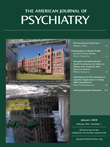Treatment-Emergent Hypomania or Mania With Modafinil
To The Editor: In the August 2007 issue of the Journal, Mark A. Frye, M.D., et al. (1) reported that in their placebo-controlled trial of adjunctive modafinil in the treatment of bipolar depression, there was no significant difference in treatment-emergent hypomania or mania between modafinil and placebo groups. In their discussion, they noted that adjunctive modafinil, like adjunctive antidepressant therapy, “did not pose an added risk of mood destabilization” ( 1 , p. 1247). This conclusion may be premature, since the authors did not address the potential confound of the significantly different use of sedative-hypnotic medications (clonazepam, lorazepam, or zolpidem) between the modafinil and placebo groups (19/41=46% versus 7/44=16%, respectively).
The importance of adequate sleep in the maintenance of mood stability of patients with bipolar disorder is well established. Experimental sleep deprivation can induce manic switching in bipolar depressed patients at rates comparable with antidepressant medications, and of note, nocturnal benzodiazepines alone have been reported to successfully manage a proportion of these induced manic episodes (2) . Furthermore, it has been hypothesized that sleep reduction associated with the numerous potential causes of mania (drug abuse, withdrawal, transmeridian travel, postpartum states, bereavement, etc.) may be a common pathway through which mania is induced (3) . The importance of adequate sleep in patients with bipolar disorder is also reflected in the study’s exclusion of subjects with a baseline pattern of <6 hours of sleep (1) .
In the case of modafinil, a wake promoting agent, the potential that sleep may be disturbed must be considered when assessing the risk of manic switching. Since subjects exposed to modafinil also used sedative-hypnotic agents at significantly greater rates, it is possible that these sedating agents either masked the symptoms of hypomania/mania or inhibited the process (i.e., sleep reduction) that might cause manic switching (4) .
In this instance, a post hoc analysis of the data may be useful to evaluate treatment-emergent hypomania or mania in modafinil-treated subjects who were using or not using sedative-hypnotic medications. Recognizing the limitations of such an analysis, it still might provide some insight into whether sedative-hypnotic use confounded the reported finding of no significant difference in treatment-emergent hypomania or mania between modafinil and placebo in this study.
1. Frye MA, Grunze H, Suppes T, McElroy SL, Keck PE Jr, Walden J, Leverich GS, Altshuler LL, Nakelsky S, Hwang S, Mintz J, Post RM: A placebo-controlled evaluation of adjunctive modafinil in the treatment of bipolar depression. Am J Psychiatry 2007; 164:1242–1249Google Scholar
2. Colombo C, Benedetti F, Barbini B, Campori E, Smeraldi E: Rate of switch from depression into mania after therapeutic sleep deprivation in bipolar depression. Psychiatry Res 1999; 86:267–270Google Scholar
3. Wehr TA, Sack DA, Rosenthal NE: Sleep reduction as a final common pathway in the genesis of mania. Am J Psychiatry 1987; 144:201–204Google Scholar
4. Wehr TA: Sleep loss: a preventable cause of mania and other excited states. J Clin Psychiatry 1989; 50(suppl):8–16; discussion 45–47Google Scholar



